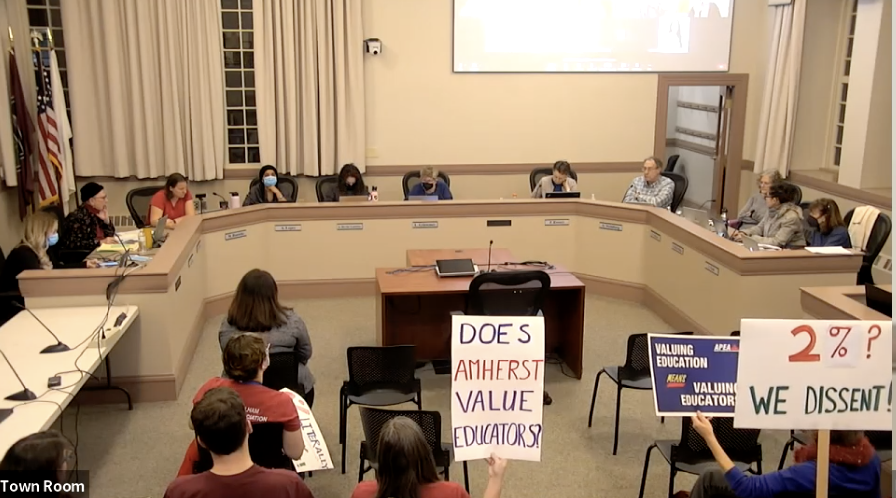APEA Marching for a Million Dollars (updated)

Joint meeting of the Amherst Town Council and The Budget Coordinating Group, November 7, 2022. Photo: Screen shot
Source: Amherst Pelham Education Association
The Amherst Pelham Education Association (APEA) issued a statement on Sunday (3/10) urging the Regional School Committee (RSC) to vote NO to the proposed 14 cuts to educator positions, which will directly affect all aspects of students’ experiences at the Amherst-Pelham Regional Middle and High Schools. The educators union has scheduled a march in support of a NO vote for Tuesday, March 12 at 4:00 p.m. The march will begin at the front entrance of the high school. The APEA will also show up in force at the high school library at 6:30 p.m. that same day as the RSC discusses and votes on the budget.
During the march, educators and community supporters will call on the RSC to try to find the $1 million that will fill the funding gap. First stop will be Town Hall to urge the town to agree to the RSC’s request for a one-time gift of $1 million. Second, the march will stop by Amherst College to inquire how much of their $3.6 billion endowment may be contributed to the public education of the town in which they are located. Third, marchers will go to the Jones Library, where the town recently approved $10 million in additional funds for the multi-million dollar renovation project.
What Will Happen if RSC Passes This Budget with Proposed Cuts
- Fewer counselors and restorative justice specialists who are critical at a time when student mental health needs are soaring. The proposed budget cuts from the District to the secondary schools includes a complete cut (not just reduction) of the Restorative Justice staff at both the Middle School and High School (2 people). Restorative Justice offers community building and conflict resolution interventions that reduce the need for suspensions.
- Gutting of the World Language program at the Middle School means less opportunity to take advanced classes in high school.
- Consolidation of High School departments means more work for fewer educators, resulting in less support for students.
- Reduction in paraeducators and special educators means greater difficulty meeting student needs.
- Reduction in High School academic intervention classes means already vulnerable students receive drastically reduced academic coaching and support.
For future healthy budgets, the APEA urges the School Committee and district to evaluate its expenses, particularly in the areas of administration and contracted workers. Interim Superintendent Doug Slaughter admitted at the School Committee on Wednesday, March 6 to paying $705,000 to a private firm for educational service providers, positions normally filled by public employees. This fee is enough to cover the average salary of about ten teachers or counselors.
For more information, contact: executiveboard@amherstpelhamed.org

The Amherst College endowment is part of a larger long-term-investment-pool whose overall value is now closer to $5B thanks to recent market gains; here is their report as of June 2023:
https://www.amherst.edu/offices/investment/annual-report#five
Somewhat serendipitously, an image of the Norwottuck Rail Trail (part of which bisects the campus, but which is owned by the Massachusetts DCR) graces this report. It brings back to mind how grateful we were when — a decade ago — the College helped mitigate serious erosion issues adjacent to the trail which had been caused by the development of their nearby playing fields and tennis courts.
That mitigation work was not only a contribution to the larger community, necessary to successfully complete the Norwottuck Rail Trail reconstruction, but also a legal obligation. And in that spirit, if it were to serve as a model for even greater community engagement by the College going forward, we’d be much obliged!